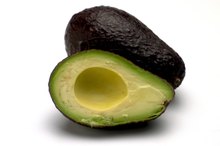Can I Live on Fruits Alone?
Fruit is an essential component of your daily diet and has many nutritional advantages, especially when you replace junk food with servings of fresh fruit. However, it's not a good idea to try to live on fruit alone. So-called "fruitarian" diets or "fruit cleanses" may have great benefits according to their proponents, but any diet that focuses mainly on one food group tends to lack essential nutritional components. Always talk to your doctor before beginning a diet plan.
Nutrients in Fruit
Fruits contain a variety of nutrients that are needed to keep your body healthy, including potassium, folate, vitamin C, vitamin A and small amounts of calcium and iron. The skin and/or flesh of many fruits are also a good source of dietary fiber. Compounds called caretenoids and polyphenols, which have antioxidant properties that can protect your body from cancer, are also found in fruits. Emphasizing plant-based foods in your diet can lower your risk of heart disease, cancer and stroke.
- Fruits contain a variety of nutrients that are needed to keep your body healthy, including potassium, folate, vitamin C, vitamin A and small amounts of calcium and iron.
Sugar
Fatty Fruit
Learn More
Although fruits are a great source of many nutrients, they also tend to contain large quantities of sugar. Fruit juices, even ones made from 100 percent fruit, are especially sugary. The U.S. Department of Agriculture recommends about two cups of fruit per day for men and 1.5 cups per day for women over age 30. In comparison, women should eat 2.5 cups of vegetables per day, and men should eat three cups. The increased amounts of vegetables is recommended because they provide similar nutrients as fruit but have less sugar.
- Although fruits are a great source of many nutrients, they also tend to contain large quantities of sugar.
- Fruit juices, even ones made from 100 percent fruit, are especially sugary.
Protein
If you only eat fruit, you'll miss out on an essential dietary component: protein. Your body needs protein to build and repair muscle and tissue and to create hemoglobin, the substance that carries oxygen to your organs. Most fruits contain very little, if any, protein; the best sources include meat, eggs, dairy products, nuts and beans. Adults need about 60 grams of protein per day, so if you only eat fruit, you will likely find yourself with a protein deficiency.
- If you only eat fruit, you'll miss out on an essential dietary component: protein.
- Adults need about 60 grams of protein per day, so if you only eat fruit, you will likely find yourself with a protein deficiency.
Precautions
What Fruits Contain Collagen?
Learn More
A "fruitarian" diet, even one with a small allowed amount of grains and nuts, may cause deficiencies in calcium, protein, iron, zinc, vitamin D, vitamin B-12 and essential fatty acids. These deficiencies can lead to problems with bone density and nervous system function. Whatever diet plan you choose to follow, be sure it's rich in all the vitamins, minerals and other nutrients your body needs each day to perform its essential functions.
Related Articles
References
- Harvard Health Publishing. Beating high blood pressure with food. Updated August 23, 2019.
- Centers for Disease Control and Prevention. Diabetes and carbs. Updated September 19, 2019.
- U.S. Department of Agriculture. Raisins. Updated March 11, 2018.
- U.S. Department of Agriculture. 100% fruit juice. Updated June 2, 2018.
- Evert A, Dennison M, Gardener CD, et al. Nutrition therapy for adults with diabetes or prediabetes: A consensus report. Diabetes Care. May 2019, 42 (5) 731-754; doi:10.2337/dci19-0014
- Cleveland Clinic. Can you eat fruit if you have diabetes? Updated June 4, 2019.
- Centers for Disease Control and Prevention. Carb counts. Updated March 21, 2019.
- American Diabetes Association. Fruit.
- NIH MedlinePlus. Glycemic index and diabetes. Updated October 13, 2018.
- Weill Cornell Medicine. Food order has significant impact on glucose and insulin levels. Updated June 23, 2015.
- NIH Office of Dietary Supplements. Vitamin C. Updated February 27, 2020.
- Wallace TC. Anthocyanins in cardiovascular disease. Adv Nutr. 2011;2(1):1‐7. doi:10.3945/an.110.000042
- Lv X, Zhao S, Ning Z, et al. Citrus fruits as a treasure trove of active natural metabolites that potentially provide benefits for human health. Chem Cent J. 2015;9:68. doi:10.1186/s13065-015-0145-9
Writer Bio
Sarah Barnes has been a professional writer and editor since 2004. She has been published in newspapers and regional magazines in the Wichita, Kansas area. Barnes holds a Bachelor of Arts in journalism from a Midwestern university.









